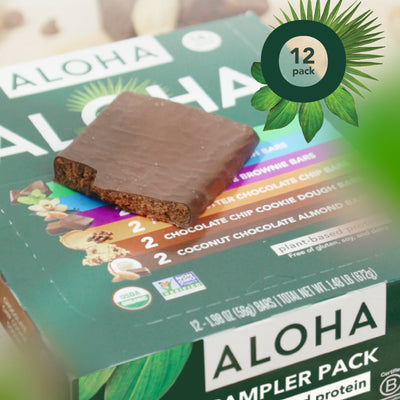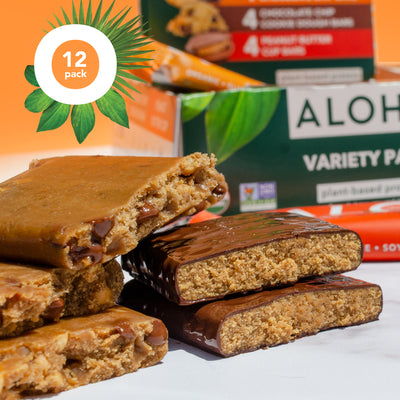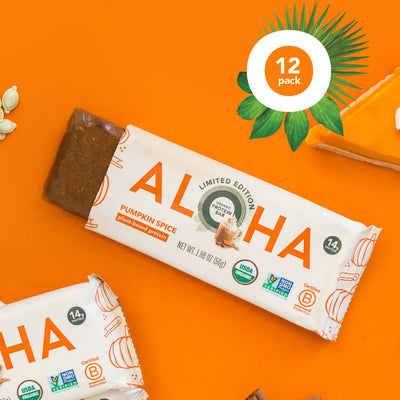Key Takeaways:
- No Need for Complex Additives: ALOHA’s plant-based protein powders focus on minimal, transparent ingredient lists, keeping the product simple without unnecessary fillers or additives.
- Easy to Incorporate Daily: Plant-based protein powder mixes easily into smoothies, recipes, and snacks. Its versatility makes it convenient for people with busy lifestyles.
- Clear Brand Commitment: ALOHA emphasizes organic, non-GMO, and clean ingredient standards. The brand’s transparency reflects a dedication to quality and customer trust.
Is plant based protein powder good for you? It’s a question that echoes through grocery store aisles, gym conversations, and online forums. With so many options filling the shelves — each promising to fuel your body differently — it can feel like standing in a crowded marketplace where every voice claims to offer the best solution.
At ALOHA, we don’t just follow the trend — we help lead it. As a brand dedicated to creating clean, plant-based nutrition, every product we make is USDA Organic, non-GMO, and free from gluten, soy, dairy, and artificial ingredients. Our protein powders reflect our commitment to simplicity, transparency, and quality you can trust.
In this piece, we’ll look at plant-based protein powders, explore what science says, and help you decide if they fit your nutritional preferences.
What Is Plant-Based Protein Powder Made Of?
As more people search for alternatives to traditional protein sources, plant-based protein powder has become popular. Its appeal lies in the variety of plant ingredients used and the simplicity of its formulation. Let’s break down what typically goes into plant-based protein powders:
- Pea Protein: Pea protein is one of the most common ingredients in plant-based protein powders. It is made from yellow split peas and offers a neutral taste and smooth texture that mixes easily. Because of its balanced amino acid profile, it’s often used as a base.
- Brown Rice Protein: Brown rice protein contributes additional plant-based protein while keeping the formula gluten-free. When combined with other plant sources, it helps round out the amino acid profile. Many formulations pair it with pea protein for a complementary effect.
- Hemp Protein: Hemp protein is derived from hemp seeds and brings a slightly nutty flavor to the blend. It’s valued for its natural fiber content, which can add a bit of texture to the powder. Its plant origin also makes it suitable for various dietary preferences.
- Pumpkin Seed Protein: Pumpkin seed protein is another ingredient often included for its rich protein content. It offers a mild flavor and blends smoothly with other plant proteins. Many appreciate that it comes from a recognizable, whole-food source.
- Other Ingredients: In addition to the main protein sources, many plant-based protein powders include organic sweeteners or natural flavors. These ingredients help improve taste and texture without relying on artificial additives. The goal is to keep the ingredient list clean and easy to understand.
Benefits Of Plant-Based Protein Powder
Plant-based protein powder has grown in popularity for good reasons that go beyond just replacing animal-based options. While many people are drawn to its simplicity, others appreciate its flexibility in their daily routines. Here’s a closer look at some of the key advantages people often consider:
Free From Common Allergens
Many plant-based protein powders are naturally free from common allergens like dairy, soy, and gluten. This makes them suitable for people who are mindful of these ingredients and allows for broader accessibility across different dietary needs.
Simple Ingredient Lists
One reason people turn to plant-based protein powders is their straightforward ingredient lists. Without complicated additives or artificial flavors, the focus stays on recognizable, plant-based sources. This simplicity appeals to those who prefer knowing exactly what they're consuming.
Versatile For Different Lifestyles
Plant-based protein powder easily accommodates various dietary preferences and eating habits. It offers flexibility, whether blended into smoothies, oatmeal, or baked goods. This allows individuals to incorporate extra protein without changing their entire meal plan.
Sustainably Sourced Ingredients
Many plant-based protein powders use ingredients that are considered more environmentally friendly to produce. The use of plants often requires fewer natural resources compared to animal-based options. This factor can resonate with people who value sustainability.
Balanced Protein Options
These powders can offer a balanced protein profile by blending multiple plant sources. Different plants contribute unique amino acids, which combine to create a more complete protein. This thoughtful combination supports a variety of dietary needs.
What Science Says About Plant-Based Protein Powder
The question "is plant based protein powder good for you?" has been the focus of many studies and discussions. Researchers have explored how plant-based protein compares to other sources and how it functions in various diets. Here’s what current research highlights about plant-based protein powder:
Comparable Protein Quality
Studies have shown that when properly blended, plant-based protein powders can offer protein quality similar to animal-based sources. Combining different plant proteins helps create a balanced amino acid profile. This allows plant-based powders to serve as a viable protein source for many people.
Digestibility
Scientific research suggests that plant-based protein powders are generally easy to digest for most individuals. Many formulations intentionally avoid common allergens and ingredients that can cause digestive discomfort, making them a practical option for those with sensitive stomachs.
Flexibility Across Dietary Patterns
Research highlights that plant-based protein powders fit well into various dietary patterns, including vegetarian, vegan, and flexitarian diets. Their plant origin allows them to blend seamlessly into diverse eating habits. This flexibility supports different nutritional approaches.
Nutritional Variety
Studies often note that plant-based protein powders bring a variety of nutrients to the table due to their diverse sources. Ingredients like peas, rice, hemp, and seeds each contribute unique nutritional elements. This variety supports those who prefer plant-derived foods.
Environmental Considerations
Scientific discussions also explore the environmental benefits of plant-based protein production. Using plant ingredients typically requires fewer natural resources than raising livestock for protein. This can be an important factor for individuals concerned about sustainability.
How To Choose A Quality Plant-Based Protein Powder
With so many options available, finding the right plant-based protein powder can feel overwhelming. But knowing what to look for can make the process much simpler. Here are some key factors to consider when making your choice:
- Check the Ingredient List: Start by reviewing the ingredient list to ensure it aligns with your preferences. Look for simple, recognizable ingredients without unnecessary additives or artificial fillers. A shorter, cleaner list often reflects a more straightforward product.
- Look for Organic Certification: Choosing a product with USDA Organic certification can offer additional peace of mind. This certification means the ingredients are grown and processed without certain chemicals or synthetic substances, which for many adds an extra layer of trust.
- Confirm Allergen-Free Claims: If you’re avoiding specific allergens like soy, dairy, or gluten, double-check the label for allergen statements. Many plant-based protein powders clearly highlight these exclusions, ensuring the product fits your individual dietary needs.
- Consider Flavor and Texture: Flavor and texture play a big role in how enjoyable the protein powder is to use. Some people prefer unflavored options, while others like naturally flavored varieties. Reading reviews or trying sample sizes can help you find one that suits your taste.
- Review Brand Transparency: Brands that provide clear information about sourcing, manufacturing, and testing can be easier to trust. Transparency often reflects a commitment to quality and customer satisfaction. Look for brands that share detailed information openly.
- Evaluate Serving Size and Protein Content: Check the label to see how much protein you get per serving. While plant-based protein powders vary, knowing the serving size helps you incorporate them into your daily routine more easily. This allows for better planning based on your personal protein goals.
Who Can Benefit Most From Plant-Based Protein Powder?
Plant-based protein powder appeals to a wide range of people, thanks to its versatility and plant-based formulation. While it fits almost any diet, some may find it especially useful. Let’s explore who often chooses plant-based protein powder:
Individuals Following A Plant-Based Diet
Those who follow vegan, vegetarian, or mostly plant-based diets often choose plant-based protein powder to complement their meals. It provides an additional protein source without relying on animal products, helping support their dietary preferences while maintaining variety.
People With Food Sensitivities
Since many plant-based protein powders are free from dairy, soy, and gluten, they are suitable for people with these common sensitivities. This allows individuals to add protein to their diets while avoiding ingredients that may cause discomfort. The allergen-friendly nature makes plant-based powders accessible to more people.
Busy Professionals And On-The-Go Individuals
For people with busy schedules, plant-based protein powder offers a quick and simple way to include extra protein in their daily routine. It mixes easily into shakes, smoothies, or snacks with minimal preparation. This convenience appeals to anyone looking for efficient nutrition.
Fitness Enthusiasts Exploring Alternatives
Some fitness enthusiasts turn to plant-based protein powders as an alternative to traditional protein supplements. They may appreciate the variety of plant ingredients and natural formulations available, which gives them options that align with personal preferences or lifestyle changes.
Environmentally Conscious Consumers
Individuals who are mindful of their environmental impact may prefer plant-based protein powders. Producing protein from plants typically requires fewer natural resources than animal-based production. For some, this factor plays a role in their purchasing decision.
Final Thoughts
Plant-based protein powder represents a thoughtful shift in how we approach nutrition. With growing attention to ingredient quality, dietary preferences, and environmental responsibility, these powders offer a straightforward solution that fits a wide range of lifestyles. They are a practical option for anyone looking to support their health with clean, plant-sourced protein.
Ultimately, it’s about making informed choices that reflect personal priorities. Whether focused on wellness, sustainability, or simplicity, plant-based protein powders provide an option that respects your body and the world.
Read also:
- How To Calculate Your Ideal Protein Powder Intake
- Top Benefits Of Vegan Protein Powder
- Protein Shake For Breakfast: Quick And Nutritious Start
Frequently Asked Questions About Is Plant Based Protein Powder Good For You
Is plant-based protein powder a good option for beginners?
Yes, plant-based protein powder can be an easy starting point for those new to supplements. Its simple ingredient list and allergen-friendly profile make it approachable. Beginners often appreciate how easily it blends into daily meals or snacks.
Can plant-based protein powder fit into a balanced diet?
When combined with various whole foods, plant-based protein powder can be part of a balanced diet. It offers one more option for adding protein to different meals. Its flexibility allows users to adjust based on personal needs.
Can I cook or bake with plant-based protein powder?
Yes, plant-based protein powder can be used in cooking and baking recipes. It works well in pancakes, muffins, and protein bars without affecting the taste. Adjust liquid ingredients as needed to maintain the desired texture.
How long does plant-based protein powder last after opening?
Once opened, most plant-based protein powders remain fresh for several months if stored properly. Always check the expiration date and reseal the container tightly. Avoid moisture exposure to maintain freshness.
Does plant-based protein powder taste different from whey?
Plant-based protein powder typically has a milder or earthier flavor compared to whey. Flavor and texture can vary depending on the blend of plant sources used. Many brands offer flavored options to improve taste.
How much plant-based protein powder should I take daily?
The amount depends on personal protein needs, which vary based on age, activity level, and dietary habits. Most people follow the serving suggestions on the packaging. However, it’s always best to consult a nutrition professional for personalized guidance.
Can plant-based protein powder be part of a post-workout routine?
Yes, many people add plant-based protein powder to smoothies or shakes after exercise. It’s a simple way to include protein in the following workouts. Always follow serving sizes that match your personal fitness goals.
How should plant-based protein powder be stored?
Keep plant-based protein powder in a cool, dry place away from direct sunlight. After opening, ensure the container is sealed tightly to preserve freshness. Proper storage helps maintain quality until the expiration date.
Does plant-based protein powder contain added sugar?
Some plant-based protein powders include small amounts of natural sweeteners, while others are unsweetened. Always check the label to review the sugar content. Choosing unsweetened or low-sugar options depends on personal taste preferences.
Can I mix plant-based protein powder with non-dairy milk?
Yes, plant-based protein powder mixes well with non-dairy milks like almond, oat, or coconut milk. This combination often improves texture and taste. Many people prefer it over mixing with water for a better flavor.
Sources:
1. Langyan, S., Yadava, P., Khan, F. N., Dar, Z. A., Singh, R., & Kumar, A. (2022). Sustaining Protein Nutrition Through Plant-Based Foods. Frontiers in Nutrition, 8(772573). https://doi.org/10.3389/fnut.2021.772573
2. Hadidi, M., Tarahi, M., Günther Innerhofer, M., Pitscheider, I., Löscher, A., & Pignitter, M. (2025). Pumpkin seed as a sustainable source of plant-based protein for novel food applications. Critical Reviews in Food Science and Nutrition, 1–26. https://doi.org/10.1080/10408398.2025.2505235
3. Jaeger, S. R., Amanda, Oduro, A. F., & Hort, J. (2024). Sensory characteristics of plant-based milk alternatives: product characterisation by consumers and drivers of liking. Food Research International, 180, 114093–114093. https://doi.org/10.1016/j.foodres.2024.114093
4. Kumar, M., Tomar, M., Punia, S., Dhakane-Lad, J., Dhumal, S., Changan, S., Senapathy, M., Berwal, M. K., Sampathrajan, V., Sayed, A. A. S., Chandran, D., Pandiselvam, R., Rais, N., Mahato, D. K., Udikeri, S. S., Satankar, V., Anitha, T., Reetu, Radha, & Singh, S. (2022). Plant-based proteins and their multifaceted industrial applications. LWT, 154, 112620. https://doi.org/10.1016/j.lwt.2021.112620
5. Hertzler, S. R., Lieblein-Boff, J. C., Weiler, M., & Allgeier, C. (2020). Plant Proteins: Assessing Their Nutritional Quality and Effects on Health and Physical Function. Nutrients, 12(12), 3704. https://doi.org/10.3390/nu12123704
ALOHA's products are not intended to treat, diagnose, mitigate, prevent, or cure disease. ALOHA's products should not replace prescribed medications or the variety of foods important to a healthful diet.
Do not self-diagnose any health condition. Work with your healthcare provider to determine how best to achieve optimal health.












